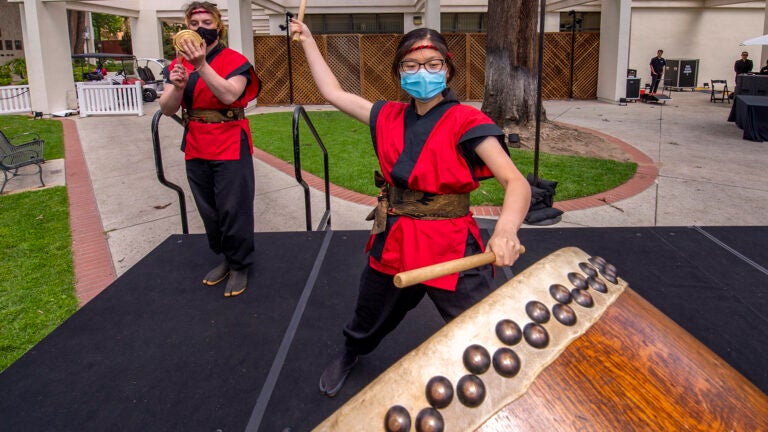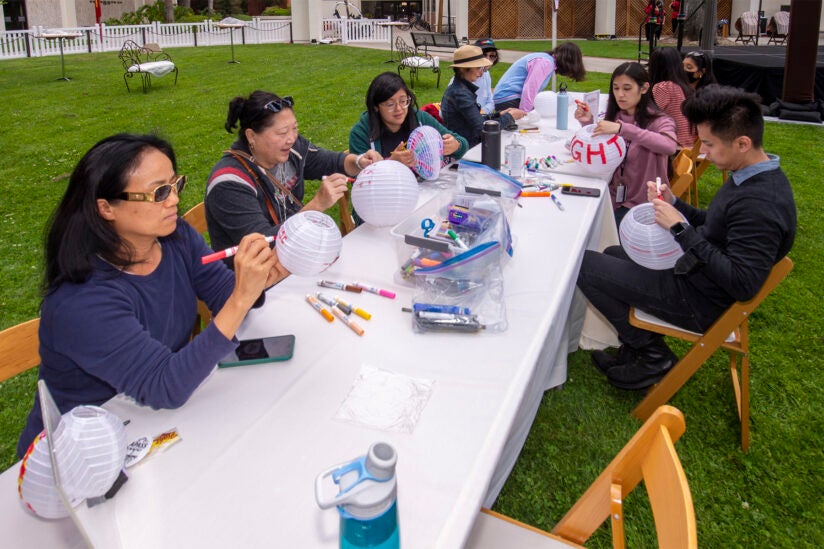
Esther Hsu hits a drum as the Kazan Taiko student group performs during the Asian American and Pacific Islander Heritage Month kickoff. (USC Photo/Gus Ruelas)
Asian American and Pacific Islander Heritage Month kicks off at USC
The commemoration begins a month early so the AAPI community can celebrate before students’ focus shifts to finals and commencement in May.
USC’s commemoration of Asian American and Pacific Islander Heritage Month kicked off a month early on Friday to give students a chance to celebrate before the hubbub of finals and commencement season. The occasion was marked by inspirational speakers, lantern-making and henna, and Taiko drumming.
It was the first year the university marked the heritage month in April, and only the second year of its broad official recognition at USC. The universitywide celebration includes events and opportunities to explore and honor Asian American and Pacific Islander heritage throughout the whole month.

“We aim to be an inclusive space for all of our students’ identities,” said Naddia Palacios, assistant vice provost for student affairs, student equity and inclusion. “This recognition means a lot to our AA&PI communities, which represent 19% of the student body at USC.”
Peter Limthongviratn, manager for leadership and education in Student Equity and Inclusion Programs, said the month is an opportunity to both “highlight the vibrant successes and the ongoing challenges of the AA&PI community.”
AAPI students and violence connected to COVID
One such challenge was uncovered in the USC Fall 2020 Healthy Minds Survey, which found that 25% of USC’s Asian American and Pacific Islander students experienced discriminatory or hostile behaviors because of the increased race-related violence that accompanied the COVID-19 pandemic.
It is our collective responsibility to ensure the safety, belonging and affirmation of our Trojan AA&PI community.
Peter Limthongviratn,
Student Equity and Inclusion Programs
“It is our collective responsibility to ensure the safety, belonging and affirmation of our Trojan AA&PI community,” Limthongviratn said.
The afternoon event also took place on a historic day for USC’s Asian American and Pacific Islander community. In the morning, USC dedicated a rock garden in honor of the Nisei students, Japanese Americans forced to leave the university during World War II. Later in that evening, the university will award posthumous degrees to those students.
President Carol L. Folt recognized the day’s significance for all Trojans.
“We see this long-overdue recognition as a step toward healing,” she said. “Decades from now, when we look back at the university’s history, today will be a standout date.”
Diversity and scope of the AAPI community
Several speakers emphasized the diversity and vast scope of the Asian American and Pacific Islander community – with ancestral roots spanning from East and South Asia to the Pacific Islands – as well as their common bond as Trojans.
USC student Neel Iyer, who identifies as South Asian, says he takes pride in the shared cultural practices and history between all Asian and Asian American groups.
I want all our Asian/Pacific students to feel comfortable and proud of who they are.
Neel Iyer, leads event planning for the month
“I feel like I am finally at a time and place where I can celebrate who I am without any fear of hate or judgment,” said Iver, who is leading event planning efforts for the month. “I want all our Asian/Pacific students to feel comfortable and proud of who they are. We have such a rich heritage and history.”
USC women’s basketball player Alyson Miura, who identifies as half Japanese and half white, added that the celebration was an opportunity to inspire a new generation.
“Representation matters, and I want to be the role model I didn’t have growing up,” said Miura, noting she didn’t see many athletes that looked like her. “I want AAPI girls to see they can also be Division I basketball players at USC.”



